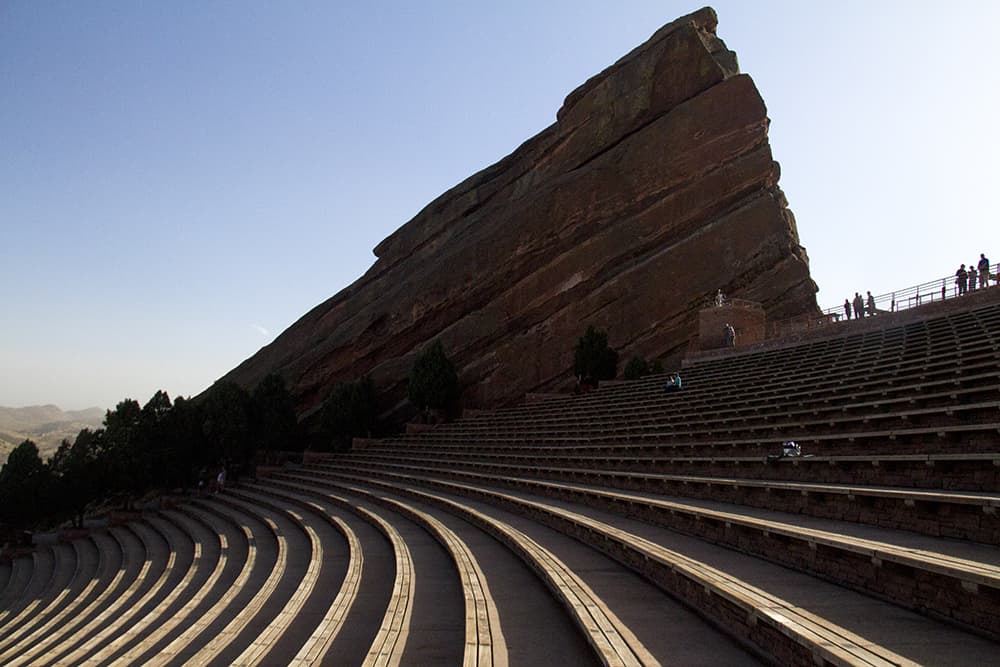It's sad: Try and buy tickets for a Red Rocks show and you'll find that plenty are canceled or postponed. The legendary, city-owned venue in Morrison is dealing with the fallout of COVID-19, which is really easy to catch, especially when thousands of people gather in one place to dance, sweat and sing.
Yet the Denver City Council on Monday OK'd two separate taxpayer-funded contracts with AEG and Live Nation, the world's largest concert promoters, totaling up to $10.5 million. The agreements are good through 2022 and lock the city into paying the companies if and when they book and promote shows at city-owned venues including Red Rocks, the Denver Colosseum and the Denver Performing Arts Complex.
The $10.5 million is not guaranteed. Instead, the $8.5 million sum for Live Nation and the $2 million sum for the Philip Anschutz-owned AEG are ceilings the companies can hit if they choose city-owned venues for their shows. In other words, the agreements are incentives to lure concerts away from places like Fiddler's Green, Pepsi Center, First Bank Center and the Fillmore.
"I'd be surprised -- if the industry came roaring back then yes, maybe, we would hit that cap, but it's kind of a no-harm-no-foul situation with a cap like that," said Brian Kitts with Denver Arts & Venues. "Some people see (the contracts) and think that that's an automatic payment to those promoters. And it's not. It's performance-based. So if their performance isn't there, there's no payout."
City council approved the contract 11 to 1 with Councilwoman Candi CdeBaca voting no. CdeBaca did not see the contracts as no-harm-no-foul agreements and said they were unnecessary at a time when the city should be watching its spending closely.
"I believe that at a time like this, we need to be re-calibrating and digging deep into our budget to reallocate dollars more appropriately to meet the needs of this crisis," CdeBaca said. "And I do not believe that these entertainment promoter contracts are relevant at this point and should absolutely be something that we're considering after we've had an opportunity to re-calibrate."
The dollars that will pay AEG and Live Nation cannot be used for, say, protective medical equipment. They come from a special revenue fund, meaning the money must stay within the city's arts department, said Skye Stuart legislative director for the mayor's office. The contracts are designed to make money, she said.
"The intent of these commission contracts is actually to increase city revenues with concessions and ticket sales associated with these large events that get booked in those facilities," Stuart said.
CdeBaca wasn't the only elected official to question the contracts. Councilman Chris Hinds said his constituents are fed up with the companies' customer service, and Councilwoman Robin Kniech bemoaned what she characterized as a monopoly enjoyed by AEG and Live Nation.
"I think that we do have a limited pool of ticket promoters in the city and we had a pretty long explanation from our (arts) department about how these two individual companies have got a corner on the market, so to speak, and are very difficult to work with," Kniech said. "But we also have major entertainment venues in the city, like Red Rocks, which we hope will be up and running again."
When it comes to how the local live music scene is doing generally, Kitts of the city arts department is not singing a happy tune. He worked for the Pepsi Center after 9/11 when the fear revolved around visible threats like weapons -- not an invisible virus.
"I've been doing this a long time and I think that it's cliche to say that we haven't seen anything like this before ... but in this case we just have no idea how it plays out," Kitts said. "So I think we're all cautiously optimistic, but you know, it's hard to say."













